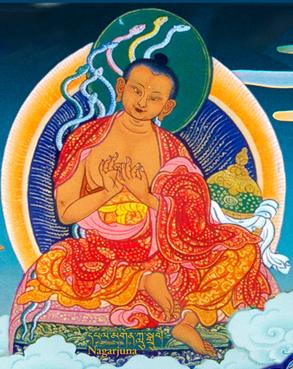Four great logical arguments of the Middle Way: Difference between revisions
Jump to navigation
Jump to search
No edit summary |
No edit summary |
||
| Line 1: | Line 1: | ||
[[Image:Nagarjuna17.JPG|frame|'''Arya Nagarjuna''']] | |||
'''The four great logical arguments of the Middle Way''' (Tib. ''dbu ma'i gtan tshigs chen po bzhi'') are: | '''The four great logical arguments of the Middle Way''' (Tib. ''dbu ma'i gtan tshigs chen po bzhi'') are: | ||
| Line 15: | Line 16: | ||
[[Category:Enumerations]] | [[Category:Enumerations]] | ||
[[Category:Philosophical Tenets]] | [[Category:Philosophical Tenets]] | ||
[[Category:Madhyamika]] | |||
Revision as of 12:58, 9 August 2007

The four great logical arguments of the Middle Way (Tib. dbu ma'i gtan tshigs chen po bzhi) are:
- 1.The investigation of the cause: the Diamond Splinters
- 2.The investigation of the result: refuting existent or non-existent results
- 3.The investigation of the essential identity: ‘neither one nor many’
- 4.The investigation of all: the Great Interdependence
Sometimes it is said that there are ‘five great arguments of the Middle Way,’ but, according to Mipham Rinpoche, the fifth — the investigation of both the cause and the effect: refuting production according to the four alternatives — can be included within the first category, i.e., the investigation of the cause.
See also Madhyamika.